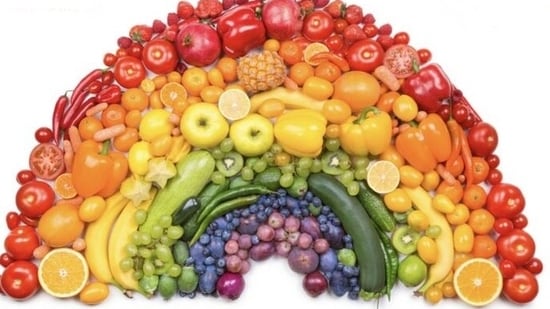Meal Plans for Weight Loss
Eat nutrient-dense whole foods on this diet that limits processed and refined carbohydrates. This plan has a moderate sodium level and is low in cholesterol.
The paleo diet focuses on limiting factory-farmed meat and eating only grass fed and wild caught fish. The diet is also high in heart-healthy fats and protein, which can help reduce hunger and promote satiety.
Different coloured plant foods contain a variety of nutrients, antioxidants, and phytochemicals that support brain function and mood regulation.
When it comes to disease prevention, boosting immunity and brain power, people often wonder what foods to add to their diet for warding off chronic diseases, dementia, depression and to supply their bodies with essential vitamins and minerals. Apart from a balanced diet, nutrition experts recommend including a blast of colours to your plate for improving not just body function but cognitive function. It is usual to feel lethargic, low on energy and anxious for people in modern times due to a combination of factors from lack of good nutrition to accumulation of stress. There is a deep connection between mood regulation and diet and if one can understand it, it’s possible to stay in the best of moods that will also support productivity and a feeling of well-being. (See pics: Fighting iron deficiency: Dietary tips to boost your iron absorption)

What is a rainbow diet
A rainbow diet is one which contains fruits and vegetables in different colours like red, yellow, purple, green, orange et al. The idea of this diet is to minimise carbs, gluten, fat or meat which could be burdening your system and making it ill over a period of time. Rainbow diet has fruits and veggies with specific micronutrients that can support health and provide necessary antioxidants and anti-inflammatory molecules. The high amount of fibre in this diet can work wonders for digestive system which can further support your overall health including mental well-being.
“Eating the rainbow is essential for optimal mental health and well-being. Different coloured plant foods contain a variety of nutrients, antioxidants, and phytochemicals that support brain function and mood regulation. As a nutritional psychiatrist, I recommend various ways to incorporate the rainbow into your diet,” says Dr Uma Naidoo, Harvard trained psychiatrist, Professional Chef and Nutrition Specialist in her recent Instagram post.
Dr Naidoo shares different ways to add colours to your plate and how they benefit you:
1. Colourful vegetables and fruits
Aim to consume a diverse range of colourful vegetables and fruits. These foods provide vitamins, minerals, and antioxidants that help protect brain cells from damage and support cognitive function.
2. Leafy greens
They are rich in folate, which is important for neurotransmitter production and mood stability:
3. Berries
They are packed with antioxidants that protect against oxidative stress, which can contribute to mood disorders.
4. Orange and yellow foods
Consume foods like sweet potatoes, carrots, and bell peppers. They contain beta-carotene and vitamin C, which are beneficial for brain health and immune function.
5. Purple foods
Include purple fruits like grapes, blackberries, and plums. They contain anthocyanins that have anti-inflammatory and neuroprotective effects.
6. Whole grains
Choose colourful whole grains like quinoa, brown rice, and whole wheat. These grains provide sustained energy and are linked to improved mood and cognitive function.
7. Nuts and seeds
Snack on a variety of nuts and seeds such as almonds, walnuts, chia seeds, and flaxseeds. They provide healthy fats, fibre, and essential nutrients that support brain health.
8. Lean proteins
Opt for lean protein sources like fish, poultry, legumes, and tofu. These foods provide amino acids that are essential for neurotransmitter production.
9. Herbs and spices
Incorporate herbs and spices like turmeric, ginger, and rosemary. They contain compounds that have anti-inflammatory and cognitive-enhancing properties.
Source: hindustantimes.com




















Add comment